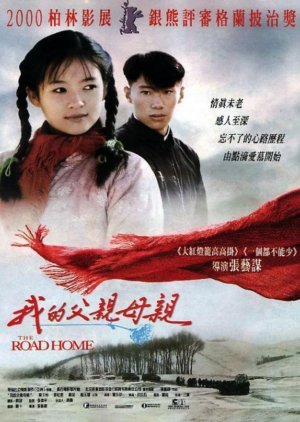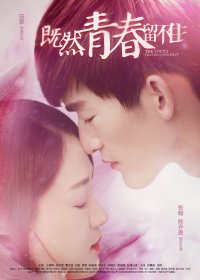
Story is very simple but endearing, moving and very romantic! Without too many unnecessary romance scenes this movie is classic romance! Well balanced with sad and joyful scenes but mostly it’s a movie that will make you smile. With the least amount of dialogues it felt very calm. Visuals were stunning and music was tranquil! Overall background was serene and only natural sounds were present but when the music played…it was just beautiful!
Another reason why I love this movie was the village setup and tradition of ‘The Way Home’. This movie reminded me of days of my life in village, whole setup was quite similar to the village in which I lived. Also the tradition of ‘The Way Home’ is exactly the same in my country; I was moved during those scenes.
Main attraction of the movie is Zhang Ziyi, brilliant in her debut movie. She’s not our usual sexy goddess and kick ass Zhang Ziyi but instead she played a very innocent, sweet, charming girl with pigtails! When she ran, when she smiled and when she spoke…everything made me smile!
…and at the end I was crying…
Notes:
Suitable and can be enjoyed by all ages.
Don’t watch it to pass the time.
This movie can be a good way to enter in the world of those ‘artsy’ movies.
Was this review helpful to you?

This review may contain spoilers
Love is found on The Road Home
The Road Home tells of a simple love story, one that is simply beautiful and sincere. It is also a look at how the past informs the present and ties those in memory together.Yusheng is a grown only child returning to the snowy mountain village where he was raised upon receiving the news that his father has died. His mother will not be consoled until he promises to have his father's body returned to the village from the nearest city by foot, a traditional custom enacted so that the dead can find their way home. As he discovers, it will not be easy, for the only people left in the village are too old or too young to be of help. He perseveres for his mother's sake and as he does he reminisces about his parents' love story.
The present is told in black and white, but as the past opens up it was like leaving Kansas and stepping into Oz. Director Zhang saturated each scene in color, making every shot worthy of being framed. Zhang Zi Yi as Di, in her first role, was ethereal as the eighteen-year-old girl, wearing pigtails and a bright red coat. The village was building its first schoolhouse and it was love at first sight when Di laid eyes on the schoolteacher who rambled into town. The small village was Luo's first job, though well educated he hadn't been able to find work until someone brought him into the mountains. On the road Di would walk the extra distance to the well by the schoolhouse just for the chance to hear his voice. On the road she would watch him walk children home and then stealthily follow him on his return until the day she emboldened herself enough to meet him. When Luo had to leave because of a political offense, Di waited for his return on the road.
Little happens, but even a broken bowl or a lost hair clip have meaning. A bowl of dumplings carried by a girl racing through the hills, propelled by young love has more meaning than a thousand sonnets. The villagers with their traditional roles look out for each other. Di and Luo have few words of dialogue but their earnest looks and actions speak volumes. Yusheng's voice over narration is almost like he's reading a book as he recites their story that he and the other villagers know by heart.
Zhang Yi Mou's use of light and color never fail to mesmerize me. He gets the most out of natural scenery whether it is a golden forest or snow covered fields. He also knows when to hone in on his actors and Zhang Zi Yi made it easy for him with her lovely expressive face. There was no doubt his camera loved her face and movement as Di ran through the mountains for a glimpse of Luo. The softly romantic music enhanced the picturesque scenes and gently developing story of true love.
The film revolves around Di, Luo and the cherished schoolhouse, both in the past and in the present. Traditions and customs thought forgotten give meaning to many in the present as Luo is brought back on The Road Home to be laid to rest. Love is both lost and found on The Road Home. Remembrance and family ties are renewed on The Road Home. This film resonated with me as Yusheng came to terms with life away from the village and the importance of the past as he traveled The Road Home. Quietly simple, the path on The Road Home is one worth traveling.
9/21/22
Was this review helpful to you?

one of the best
don't know about anyone , but i feel like one of the best movie i watched, sample story but love itWas this review helpful to you?

This review may contain spoilers
You Might Be Hard=Pressed to Find a Sweeter and More Loving Film Than This Masterpiece!
With all of the complex love stories that come out of Hollywood these days, you sometimes enjoy the refreshing feeling of a love story that is simple. I am not necessarily stating that one is better than the other, but you often find that many complex love stories just don't completely work. The Road Home is a beautiful, simple love story that is as simple as the time and location in which it takes place, and the pieces fit together like a simple jigsaw puzzle.The son of Zhao Di has come home to the village where is mother is from. He learns that his father has passed away. While the son grew up in the village, he has spent much of his adult life in the city. He has come home to be with his mother and to help her makes plans for his father's burial. His mother insists that his father be walked from the city hospital back to the village. Understand that this is no easy task since the village is good distance from the city. Her son tries to talk her out of it, but she is adament. And it is in the re-telling of how Zhao Di met her husband that convinces both the son and audience to understand why she wants to walk her husband back to the village.
The film takes off from here as the talented Zhang Ziyi portrays the young Zhao Di. She is an eighteen year-old girl living with her blind mother. She is a beautiful young woman with many suitors wishing for her hand in marriage. She has turned them all down. We don't know why except that we can guess that she hasn't found what she's looking for in a husband. Enter Luo, the new school teacher who has come to the village after living in the city. Zhao Di is immediately captivated upon first seeing him.
The sweetness in this film is in the simplicity of the village and the time. Water must be fetched from nearby wells. Looms are used to make clothing and cloths. And even the "courtship" that is done more by Zhao Di than by Luo is sweetly simple. She uses her culinary talents to make the best dishes with the hope that Luo will eat from her dish. She waits by the road for one glimpse of Luo. She walks to the well that is near the school for the chance that she might see or hear Luo.
People often make the mistake that the more primitive a technological country, the more unhappy the people must be. And yet,Zhao Di is not an unhappy girl. She is an excellent cook, and she enjoys looking after her mother. You get the sense that she does this not out of a sense of duty, but because she wants to. Zhao Di never lives anywhere else but in the village. The village is where she is happy.
Zhang Ziyi is simply brilliant is capturing the sweetness and determination of Zhao Di. She portrays Zhao Di with a fierce persistence to win the heart of Luo at any cost. You will see several scenes in which she demonstrates this.
I must mention the cinematography. The locations and colors that are captured reveal an almost magical world with golden leaves on the birch trees and snow-swept hills of winter.
Director Yimou Zhang does a great job of incorporating the technology of the time period. In many ways, I was as captivated by the use of the loom, the sweatbox used for cooking dumplings, and the walk to the well as I was of the sweet love story. I like his use of black and white in the future, and then the use of color for the past. Most directors would do it the other way around. And yet the color used for the past seems to show that it is revealing a happier time when young Zhao Di was in the fullness of her life, and the black and white showing how life is swiftly coming to an inevitable close for her after the loss of her one true love.
The Road Home will capture your heart with its story and your eyes with its images. Many saints, masters, and philosophers over the course of the centuries have stated that love is actually very simple; it is we who make it complex. This beautiful film seems to truly capture that idea.
Was this review helpful to you?








































